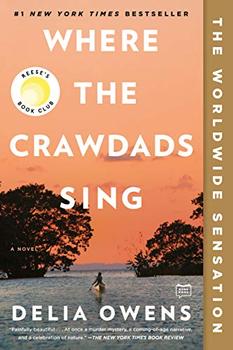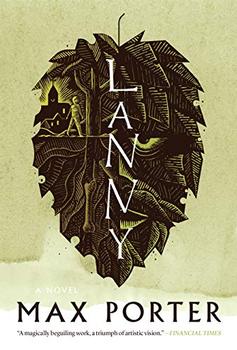Summary | Excerpt | Reading Guide | Reviews | Beyond the book | Read-Alikes | Genres & Themes | Author Bio

A Novel
by Sarah MossA suspenseful, literary coming-of-age novel set in rural Northumberland, England, Ghost Wall tackles potent themes of feminine power, rage and resistance, toxic masculinity, and survival. Although set in the 21st century, Sarah Moss contrasts primitive ways with contemporary attitudes to build tension throughout the narrative. The short prologue describes a brutal ritual sacrifice that happened in the area in ancient times. Moss then shifts to the present to introduce her protagonist, but this violence still hangs in the air. 16-year-old Silvie is assisting her parents on a historical reenactment project, guiding a team of young adult archaeology students (Peter, Dan and Molly) and their professor Jim on a short course to practice traditional bushcraft. This involves adopting the clothing and tools of the ancient Picts who thrived in Northumberland before the Romans conquered the region in the mid-first century A.D.
Silvie reluctantly follows her parents' demands, although she yearns for autonomy. In normal life, Dad scrapes a living as a bus driver; but his work holidays are devoted to being an amateur historian and reenactment guide. Mum, usually a grocery store clerk, is in charge of cooking and cleanup on the trip. Silvie has learned from earliest childhood how to survive: hunting, gathering and enduring her father's tempers. His physical punishments with his Iron Age leather belt are particularly cruel, and Silvie's spirit sparks with rebellion.
It went on longer than usual, as if the open air invigorated him, as if he liked the setting. I thought about the leather of his belt, the animal from whose skin it was made, about the sensations that skin had known before the fear and pain of the end.
Much of the suspense in this short, artfully crafted novel is subtle, yet distinctly perceptible. It is revealed through Silvie's vivid and precocious point-of-view, and her inner thoughts often contradict what she dares to speak aloud.
Mum, what about dinner, I said, and tea? It'll be whatever you gather this morning, she said, maybe fish, there must be berries, this time of year. You don't, I thought, gather fish, there has to be murder done and you won't be the one doing it, Mum, but instead of saying so I put a couple more kindling sticks on the fire and one of the nice dry logs the students had chopped as part of their archaeological experience.
Accustomed to being isolated from her peers, Silvie guides the archaeology students through bog and heather seeking nuts, bilberries, mushrooms and mussels. Pete, Dan and Molly challenge Silvie's sense of boundaries; they don't hide their puzzlement when she obeys her father's demands. Dad takes pride in his skills with ancient bushcraft and holds a disdainful attitude about the "spoiled" students and their professor's book-learning. He uses Silvie as a role model and pushes her to demonstrate how to use a flint blade to gut and bone rabbits. The social dynamics, characters and brilliant descriptions keep tension splinter-sharp throughout.
Silvie is attracted by Molly's free spirit. One blistering hot day they're foraging and come to a swimming spot, where Molly strips down (in front of the guys) to swim: free, naked, wild and lovely. Molly also sneaks away from camp to go to the pub or to buy junk food, and she encourages Sylvie to break out of her shell. Sylvie is fearful, yet follows along for the adventure.
We do have to do some foraging, I said, they'll be wondering where we are. I do have to get something to eat, Molly said, something with some taste and energy in it, I reckon I'd rather live in the shadow of nuclear war with ice cream and crisps and conditioner than in primitive purity with half-ground grains and rabbits' guts.
Silvie is preoccupied—and rightfully so—with what the land provides versus what humans take. She comes off as an eco-warrior, keen to conserve, not gathering more than necessary, and tuned into the land's patterns and cycles. Yet, she is uncertain of her place in the modern world, where she fits in, whether she will ever attend university, or even whether she wants to. In Ghost Wall, much emotional energy vibrates beneath the surface of scene and dialogue. The author asks profound questions about what remains—ghosts, artifacts, music, stories—when an entire culture is disrupted. Archaeology in the region of Hadrian's Wall has unearthed many traces of the Picts who once roamed wild in Britain: tools, dwellings, clothing and burial rites. Prized finds include bog bodies (corpses preserved intact for centuries by the chemistry of the bog), some of which are believed to be evidence of ritual sacrifice.
The novel pivots when Dad and the professor decide to re-enact a ritual bog sacrifice, supposedly once performed with a woven reed "ghost wall" and eerie music to terrify Roman invaders. The chosen victim for their re-enactment proves—no surprise!— reluctant to roleplay. Rather than spoil the very extraordinary and satisfying ending, I'll simply urge readers to savor this eerie, page-turner of a novel. While history has been told for the most part from male-dominated vantage points, Ghost Wall explores traces of divine female wisdom, and women's marvelous, often secret ways of nurturing and sheltering each other. Sarah Moss has created a cinematic jewel of fiction, sure to spark conversation for its literary beauty as well as potent themes.
![]() This review was originally published in The BookBrowse Review in March 2019, and has been updated for the
January 2020 edition.
Click here to go to this issue.
This review was originally published in The BookBrowse Review in March 2019, and has been updated for the
January 2020 edition.
Click here to go to this issue.

If you liked Ghost Wall, try these:

by Delia Owens
Published 2021
Winner of the 2018 BookBrowse Debut Author Award
How long can you protect your heart?

by Max Porter
Published 2020
An entrancing new novel by the author of the prizewinning Grief Is the Thing with Feathers.
A truly good book teaches me better than to read it...
Click Here to find out who said this, as well as discovering other famous literary quotes!
Your guide toexceptional books
BookBrowse seeks out and recommends the best in contemporary fiction and nonfiction—books that not only engage and entertain but also deepen our understanding of ourselves and the world around us.